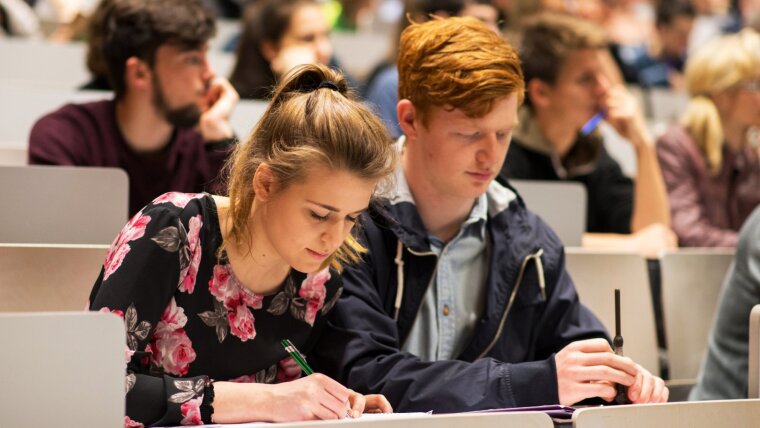
The teaching strategy of the University of Jena thus continuously addresses current topics relating to challenges, goals and needs in teaching. In doing so, it provides scope for the organisation of subject-specific learning opportunities as well as for the bundling of interdisciplinary activities.
This teaching strategy also serves as a basis for the targeted further development of teaching throughout the university. An essential component of such a further development process of the teaching strategy is also the evaluation of initiated measures. To this end, the extent to which the objectives of the teaching strategy have been achieved and whether the identified challenges have been successfully addressed must be regularly reviewed.
The next step is to derive specific goals and measures for the current challenges listed. The initiated dialogue process must be continued and expanded in order to ensure the broad participation of teaching staff and students in the strategic development of teaching in the long term.
-
We are committed to the unity of research and teaching.
Friedrich Schiller University understands research and teaching as equal and interdependent components of science. Research orientation is the specific feature of university teaching, i.e. good teaching conveys the current state of research and the awareness that knowledge is dynamic. Teachers can gain important impulses for their research from lively discussions with students.
-
As teachers and students, we contribute to the success of teaching and learning in a spirit of cooperation and mutual respect.
Good teaching thrives on the commitment of teachers and students alike and ideally results in a mutual increase in knowledge. Teachers are required to provide high-quality learning opportunities in terms of subject matter and didactics, to reflect on the success of their teaching, and to continually develop their courses. Students, for their part, contribute to the success of their teaching by taking a responsible and active role in the courses offered, studying with commitment, and providing constructive feedback on the courses offered.
-
Our teaching aims at expert and critical reflection within and outside the academic world.
Good academic teaching not only conveys sound knowledge, but also cultivates a critical and reflective attitude in students. It instructs students to evaluate scientific findings and to ask and clarify technical questions themselves. It enables students to establish connections between research results and professional problems. Students learn scientific ethical standards and consider these in their studies future professional life.
-
In our teaching, we keep in mind the holistic educational mission of the University.
It is not enough to measure academic success solely by acquired knowledge and examination results. On the contrary, the central goals of studies at Friedrich Schiller University include shaping and developing students’ personalities, different facets of motivational, emotional and social competences, as well as the responsible use of acquired knowledge and skills. Good teaching aims at the active participation in democratic societies as well as the ability and willingness to constantly reorient oneself in the face of ever changing challenges.
-
In our teaching, we are committed to dealing with diversity.
A non-discriminatory, acceptance-based interaction among students as well as between students and teachers is an indispensable prerequisite for successful learning. We emphasize the opportunities that are associated with diversity among students and teachers. We develop solutions for the resulting challenges in teaching. We take into account the diverse learning requirements of students when developing study programmes and teaching concepts.
-
We take the diversity of research cultures into account in our teaching.
Our research cultures are shaped very differently by numerous factors. This results not only in different research methods and different perspectives on the world, but also in the need to develop concepts, working methods and formats in teaching that are appropriate for the specific subject. We respect this diversity of approaches to subject-specific questions in teaching and are committed to creating the necessary framework for this.
-
We offer interdisciplinary perspectives in our teaching.
Many scientific and socially relevant questions can only be solved within the framework of interdisciplinary cooperation. The prerequisites for this are openness and respect for other subject cultures and an awareness of the limits of one's own professional perspectives. We exemplify this attitude in our teaching. At various levels and in various formats, our teachers provide students with interdisciplinary learning opportunities.
-
We appreciate and support commitment in teaching.
We are committed to creating conditions in which teaching can be realized on a broad basis and at a high level. At Friedrich Schiller University, special commitment, inventiveness and outstanding achievements in teaching are encouraged, made visible and awarded. We offer lecturers the necessary scope for developing and implementing new ideas and concepts. When assessing scientific performance, we consider both research and teaching as performance dimensions.
-
We continuously develop teaching at our University.
Teaching can only keep improving if it is measured by the achievement of its goals. This requires suitable instruments to make learning outcomes and desiderata comprehensible. The departments use the corresponding findings under their own responsibility for the further development of teaching. Friedrich Schiller University therefore provides support structures for teaching evaluation and for the qualification of teaching didactics in higher education and constantly develops them further.
-
We maintain discourse about our teaching-related values.
The further development of teaching also touches upon normative aspects to a considerable extent. These include the questions of what is understood by good teaching, which minimum standards we do not want to fall below in teaching, and which overarching values should guide teaching at Friedrich Schiller University. For us, the discourse on these and similar questions is part of quality development. Teachers and students regularly engage in this discourse in various formats and in public at the University.